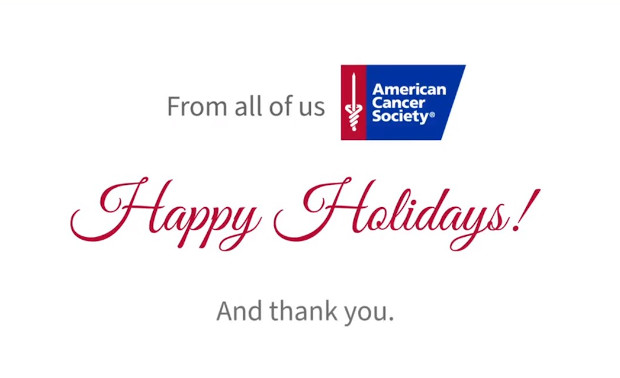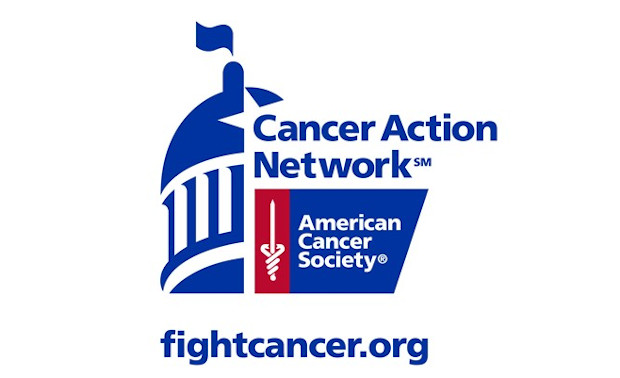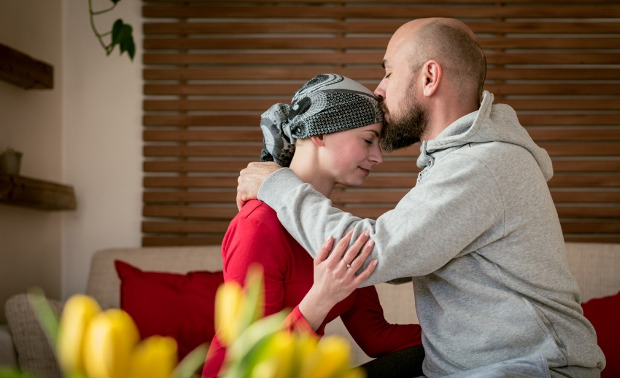Thursday, December 31, 2020
Monday, December 28, 2020
ACS report cites opportunities for improved cancer care
This is the last article in our Blueprint for Cancer Control.
A new report finds that despite progress in the decline of cancer mortality, there are still critical gaps, including the need to develop better tools and explore research opportunities that would lead to limiting cancer as a major health concern.

This article completes an eight-part series outlining our vision for the future control of cancer. It appears in the ACS Journal, CA: A Cancer Journal for Clinicians.
Authored by Lynne W. Elmore, PhD, and colleagues, this piece integrates conversations with more than 90 leading cancer experts to facilitate a comprehensive and diverse national research portfolio of new opportunities to advance evidence-based approaches for all cancer patients and communities. “Our overall goal is to motivate a strategy to develop innovative approaches for cancer prevention, interception, treatment, and improvement of quality of life for cancer survivors, and these findings present incredible potential for collaboration and clinical impact,” write the authors.
The report highlights a gap in cancer care related to inconsistent coordination between researchers and caregivers. The authors point out the need to narrow knowledge gaps in understanding the biology of cancer development in early stages and its treatment resistance to ensure that all cancer patients can be provided cancer care that is effective, practical, and affordable.
They also believe that success depends on the need to develop the next generation of tools to understand, prevent, and better control all cancer types. In 2019, only about one-half of patients with cancer in the U.S. could be cured with existing therapies, and the remaining one-half were expected to die of their disease. In addition, while data shows that therapeutic interventions have improved significantly, chronic comorbidities often adversely affect cancer survivors and their quality of life.
The authors also note that maximizing opportunities for clinical impact requires a focus on broad-based integration of research efforts including data sets, cancer models, and testing combinatorial strategies to screen, detect, and diagnose cancers. Other opportunities for research integration include forming transdisciplinary scientific teams, increasing the recruitment of ethnically and racially diverse populations in clinical trials, and testing innovative strategies to improve cancer prevention, diagnosis, treatment, and survivorship in underserved communities.
“Our ability to manage cancer as a chronic disease will continue to grow and demand increased investments in survivorship research to maximize quality of life for people with cancer, their families, and caregivers,” said Lynne. “While it can appear daunting to consider all that needs to be done in research to conquer the hundreds of diseases we group together under the moniker of cancer, this report shows that if we continue to collaborate and leverage collective resources progress can continue to be made in the future of cancer care.”
*Shared from MySocietySource.
Sunday, December 27, 2020
Saturday, December 26, 2020
We are indebted to our volunteers and supporters - thank you!
This year has tested our American Cancer Society like no other. We all learned to innovate and found new ways to serve patients, connect with communities, and raise money.
While the COVID-19 pandemic has changed so much about how we fight for a world without cancer, it did not take away your courage or determination. In countless ways, your passion shone through as you continued to support our mission to save lives in 2020.

- With your support, we offered the use of our Hope Lodge facilities to our partner health systems free of charge as a place of respite for front-line health care heroes.
- Through our 1.800.ACS.2345 hotline and cancer.org, we continued to provide 24/7 support to cancer patients, who were particularly vulnerable amid the pandemic.
- ACS CAN impacted access to health care by supporting patient provisions in congressional COVID-19 relief packages, including expanded telehealth services and funding for state public health agencies, and by leading campaigns in Oklahoma and Missouri that expanded access to affordable health insurance through Medicaid for an estimated 430,000 people.
- Our event and peer-to-peer volunteers and staff worked tirelessly to innovate and fundraise throughout the year without the benefit of in-person engagement.
- Corporate, philanthropy, and direct mail results have brought in a strong, steady stream of revenue, and planned giving revenue is also expected to finish strong in 2020.
- Our investment in digital marketing is paying off, with Giving Tuesday revenue up 49% year-over-year, which gives us momentum to drive further year-end giving results.
- Our year-end giving campaign holds great promise. Please share why you support the American Cancer Society on your social channels with a personalized message and link to our year-end giving campaign.
Friday, December 25, 2020
Thursday, December 24, 2020
Read Gary Reedy's op-ed on how the pandemic has affected cancer patients
In a Dec. 16 op-ed in the Atlanta Journal Constitution (ajc.com), American Cancer Society CEO Gary Reedy discusses how COVID-19 has delayed cancer treatment schedules and preventive diagnostic services.
"The continued delays that cancer patients and survivors are experiencing are deeply concerning," he writes.

He cites an early study from the National Cancer Institute that suggests almost 10,000 excess deaths from breast and colorectal cancer over the next decade will be due to disruptions in cancer screening and treatment.
And, a recent survey by our advocacy affiliate, the American Cancer Society Cancer Action Network (ACS CAN), shows the significant effects the pandemic is currently having and will continue to have on cancer care:
- More than a quarter (26%) of cancer patients and survivors reported delays in their cancer-related care because of coronavirus.
- When looking at respondents in active treatment for their cancer, the number increased to nearly one in three (32%). This included 21% of patients in active treatment who reported a delayed or canceled check-up or follow-up appointment specific to their cancer care.
- Some 64% of all respondents, and 74% of those in active treatment, said they were worried about their ability to stay safe if COVID-19 cases continue to increase.
To ensure that cancer prevention and early detection remain a public health priority, ACS is partnering with other national organizations on a coordinated effort to support returning to screening safely. See our guidance for health systems.
*Shared from MySocietySource.
Wednesday, December 23, 2020
House passes clinical trials bill; Senate action needed
The Henrietta Lacks Enhancing Cancer Research Act had strong bipartisan support.
On Dec. 9, 2020, the U.S. House of Representatives passed legislation aimed at improving access to clinical trials for communities of color and decreasing health disparities.

The Henrietta Lacks Enhancing Cancer Research Act works to increase access and remove barriers to participation in federally sponsored cancer clinical trials among communities that are traditionally underrepresented in trials. The bill is named after a Black woman from Baltimore who died from cervical cancer and whose cells cultivated during her treatment have been used to develop some of modern medicine’s most important breakthroughs, including the development of the polio vaccine and treatments for cancer, HIV/AIDS, and Parkinson’s disease.
“While cancer impacts everyone, it does not affect everyone equally,” said Lisa Lacasse, president of ACS CAN. “The Henrietta Lacks Enhancing Cancer Research Act is critical to changing this reality, improving cancer outcomes, and reducing health disparities in this country.”
ACS CAN is pleased to see the bill pass the U.S. House of Representatives with strong bipartisan support. This legislation would direct the federal government to study policies that impact diverse participation in federally sponsored cancer clinical trials nationwide and recommend potential policy changes that would reduce barriers and make it easier for patients from diverse backgrounds to enroll in clinical trials.
“This year marks Henrietta Lacks’ 100th birthday, and we are proud of all the good that she has done for the world,” said Lawrence Lacks, Sr., Henrietta Lacks’ eldest son. “While Henrietta Lacks’ HeLa cells were taken without her knowledge or consent, her contribution has had a significant and wide-reaching scientific impact. This legislation honors and builds on my mother’s legacy by helping to ensure communities of color have more equitable access to advances in cancer treatment.”
Communities of color and other medically underserved groups continue to have higher cancer rates and are less likely to be diagnosed early or receive optimal treatment compared to other groups. Yet communities of color, older Americans, rural Americans, and poorer Americans remain under-represented in cancer clinical trials. In addition, there is a 4-fold disparity in the proportion of Blacks diagnosed with cancer in the U.S. as compared to the proportion participating in clinical trials submitted to FDA for drug approval.
“The current statistics are unacceptable. Clinical trials represent the best opportunity for all patients to receive the most cutting-edge cancer treatments and need to be easy for patients to access, regardless of race, ethnicity, socioeconomic status, geographic location or age,” Lisa said. “We cannot achieve our mission of a world with less cancer until we reduce the burden of this disease across all communities. Now is the time for meaningful action. ACS CAN urges the Senate to take up and pass this bi-partisan legislation this Congress.”
*Shared from MySocietySource.
Tuesday, December 22, 2020
House votes to close colorectal cancer screening loophole
ACS CAN urges the Senate to take up the bill.
On Dec. 9, the U.S. House of Representatives unanimously passed the Removing Barriers to Colorectal Cancer Screening Act that would phase out surprise out-of-pocket expenses that can act as a barrier to lifesaving colorectal cancer screenings for Medicare beneficiaries.

Colorectal cancer screenings are covered in full under private health insurance plans as a result of the preventive care provisions of the Affordable Care Act. However, a loophole in Medicare allows for cost-sharing if a polyp is discovered and removed during a screening colonoscopy resulting in Medicare beneficiaries receiving a surprise bill after the procedure, often in the hundreds of dollars. Evidence shows that any potential cost-sharing can deter people from getting a preventive, and potentially lifesaving, screening.
The following is a statement from Lisa Lacasse, president of the American Cancer Society Cancer Action Network (ACS CAN).
“In a show of strong, bipartisan support, the U.S. House of Representatives has taken a stand to protect more Americans from colorectal cancer. We know colorectal cancer can be prevented with regular screenings, and that it is more treatable when found early. Yet too many individuals on Medicare are forced to forego this procedure due to the fear of an unexpected cost. Thanks to the House of Representatives’ action today to phase out cost-sharing for colorectal cancer screenings in Medicare, we can further reduce suffering and death from this preventable disease.”
“Closing the loophole that allows Medicare to charge seniors cost-sharing for colonoscopies when a polyp is found and removed has been a longtime priority for ACS CAN. Our volunteers have worked tirelessly with their Members of Congress to extend to Medicare beneficiaries the coverage and peace of mind that individuals on private health plans currently enjoy.
“With nearly 150,000 individuals in America expected to be diagnosed with colorectal cancer this year alone and more than 53,000 estimated to die from the disease, ACS CAN and our volunteers across the country strongly urge the Senate to take up and pass this important policy before the end of the 116th Congress. Doing so will help increase colorectal cancer screenings rates and save lives.”
*Shared from MySocietySource.
Monday, December 21, 2020
Sunday, December 20, 2020
Discovery Shop gifts
This giving season, safely score 25% savings on Discovery Shop gifts for family and friends, and indulge in some much-needed
self-care! Your Discovery Shop purchases help us recover losses due to the
pandemic and support the American Cancer Society lifesaving mission. To find a
shop nearest you, visit: cancer.org/discovery
Saturday, December 19, 2020
Handling a serious illness through the holidays during the COVID-19 pandemic
Holiday time may seem like the worst time to be sick or have an illness in the family. Even the warmest of traditions lose their luster when you're worried about your health care needs or those of someone you love.
This year, the stress of the COVID-19 pandemic adds even more concern for people already facing another serious illness. Holiday gatherings are likely to be quite limited for many people, leading to feeling stuck at home, isolated, and sad. But you can still plan for and have meaningful celebrations.

If you or someone close to you has cancer or another serious illness this year, use these tips and resources to help lift your holiday spirits. Coping with stress in a healthy way will help make you, the people you care about, and your community stronger.
Do:
- Feel your feelings: Give yourself permission to feel and express your feelings, whether of joy, fear, sadness, or pain. Let yourself laugh or cry.
- Take care of yourself: Eat balanced meals and make time for some exercise. Physical activity, whether done indoors or outdoors, is a healthy way to release tension.
- Allow yourself simple pleasures: Take a warm bath, a nap, or eat your favorite foods to help lift your mood.
- Find distractions: Think about and plan time for bingeing on a TV show, fixing a fancy dinner, watching a live or recorded sports event, playing cards or other virtual games with friends, or taking a walk or drive around your block or in a local park to see the holiday lights.
- Prepare for the holidays: Decide if you need to adjust certain traditions or create new ones, such as a having a virtual gathering and shopping online. Plan in advance how you want to spend your time, who you'd like to conenct with, and what technology or devices might help make those connections easier.
- Enlist support: Rely on those around you to safely help with shopping, decorating, gift wrapping and delivery, and meal preparation.
- Learn to say no: You don't have to do everything. People will understand if you can't attend or do certain activities.
Don't
- Don't pressure yourself: Try not to set unrealistic expectations or try to do everything yourself.
- Don't overindulge in alcohol. It's best not to drink alcohol. And, alcohol is a depressant, so it can "bring out" or heighten bad feelings.
- Don't try to change your feelings: It's OK to feel sad. Don't try to force yourself to be happy just because it's the holiday season.
- Don't spend more than you can afford: Buying things will not make up for any negative feelings you are having. Shopping online can be fun, but can also become a habit. Decide how much money you can afford to spend on gifts and other items. Then stick to your budget, and look for the many good deals that are available, too.
- Don't try to do too much in one day: Plan ahead, setting aside specific days for specific tasks.
- Don't abandon healthy habits: Eat and drink in moderation. Get plenty of sleep!
If you're grieving over the holidays
For people who have lost a loved one, the holidays can be even more difficult. Allow yourself to feel pain and whatever other emotions come along, too. Try following some of the tips above, and remember that although working through grief is important, it's OK to give yourself a break from grieving by distracting yourself with activities you enjoy. Try to use this time to forgive yourself for all the things you did or didn't say or do.
And remember that you don't have to handle your grief alone. Talk with your family and friends about your loss, or find others who have lost a loved one. Your American Cancer Society is available 24 hours a day, 7 days a week and can help you find support online, local bereavement groups, and other resources. Call 1-800-227-2345.
*Shared from MySocietySource.
Guidance available for return to screening amid pandemic
Disruptions in screening could exacerbate disparities.
Prevention and early detection are critical to our mission. Unfortunately, too many people remain unscreened, and the situation caused by the pandemic is resulting in a decline in cancer screening rates.
In response to these challenges, the American Cancer Society is leveraging our extensive expertise to provide guidance on how public health agencies, health care providers, and screening advocates can promote and deliver cancer screening appropriately, safely, and equitably during the COVID-19 pandemic.
We’ve created a comprehensive toolkit that includes screening messages and guidance for breast, cervical, colorectal, and lung cancers, as well as HPV vaccination.
*Shared from MySocietySource.
Tuesday, December 15, 2020
Monday, December 14, 2020
Matching Gifts
Many employers sponsor matching gift programs and will match any charitable contributions or volunteer hours made by their employees. To find out if your company has a matching gift policy which can help you donate even more to the American Cancer Society visit www.cancer.org or talk to your human resources department.





























